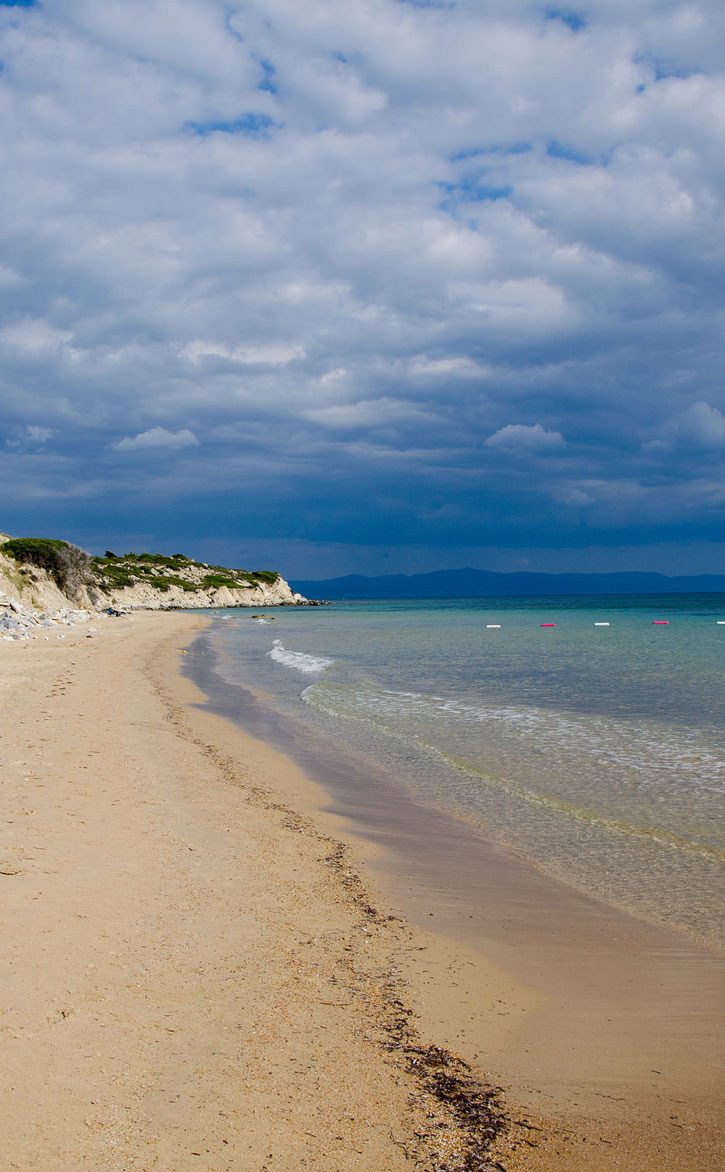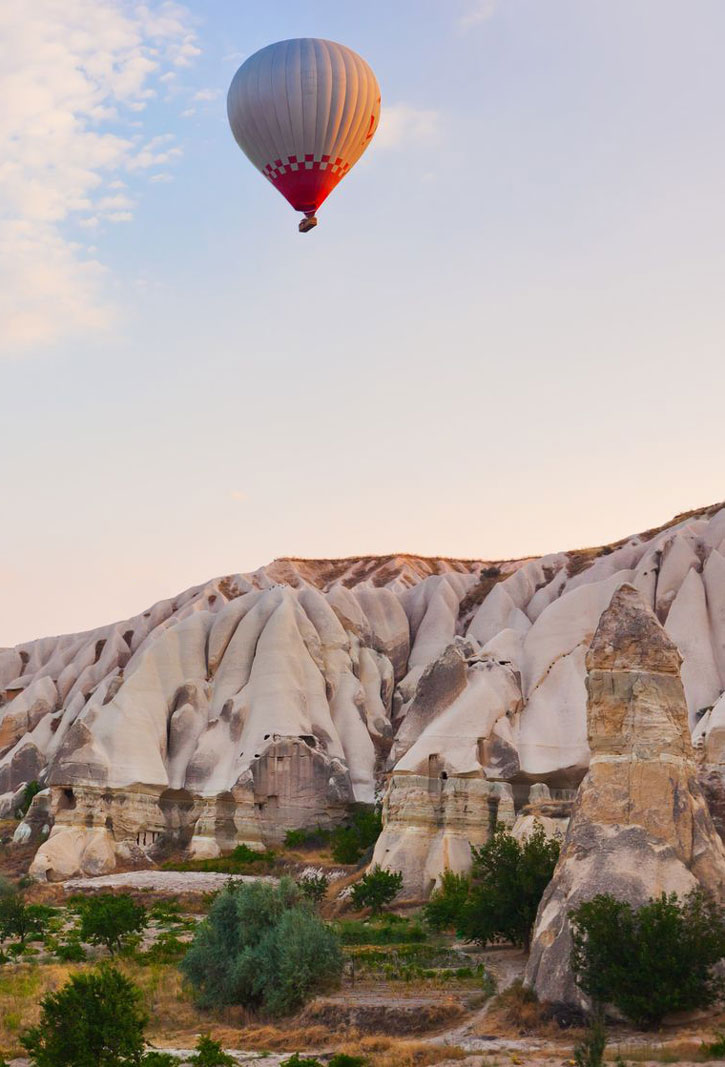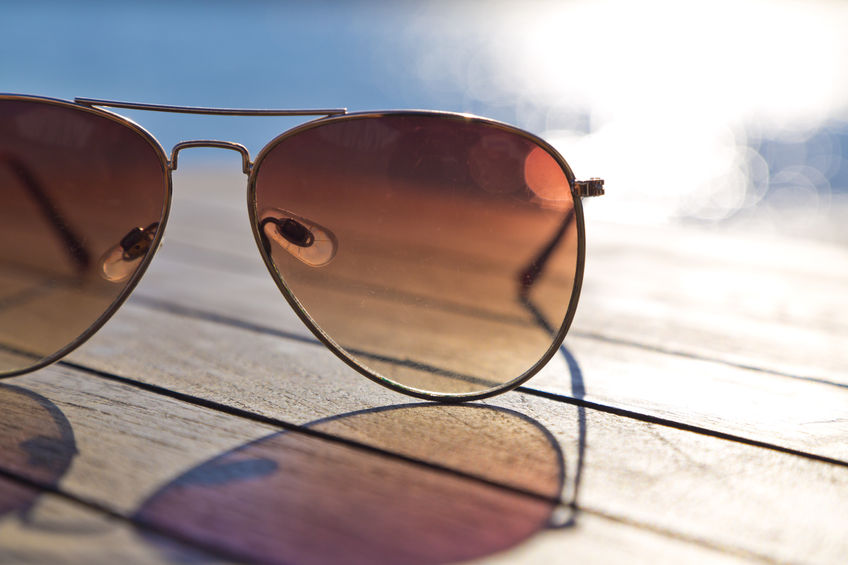She’s wearing a beige heavy-cotton trench coat buttoned from neck to knee with a long black dress underneath. Her black and red satin hijab is wrapped firmly around her face, which is rouged slightly with makeup. Her appearance contrasts with those of the local Anatolian ladies also on board who sport geometric cotton shirts tucked into ballooning high-waisted floral shalvars. I look a little more casual with an unkempt t-shirt and blue jeans. My blonde hair is thrown up in a messy salt-water washed bun fresh from the beaches of Bozcaada Island.

Beach on Bozcaada Island. Photo © canonim, licensed Creative Commons Attribution.
I’m a little nervous as I look out to the stark and dusty surroundings; I’m unsure of where the dolmuş stops and where to catch my connecting bus.
“Are you married?” the woman next to me queries in Turkish, pointing to the gold ring on my right ring finger.
“Yes. I am married,” I answer in Turkish, with some guilt of telling a white lie.
More questions follow and I find myself promoting my boyfriend to my husband. I’m a writer with a special project on Bozcaada (that part was true) and thanks for asking, I don’t have children yet—but I’m planning to soon.
The slight spin on my life feeds the conversation and my clumsy use of her mother tongue humors her greatly. She pulls out her phone to share photos of her own husband, her children, and of herself in a sundress and without a hijab bathing on the beaches of Bozcaada. I appreciate the insight into her life so I present my phone for her to scroll through the images of my travels, my family, and of the man now known as my “husband”.
We stop on the roadside in a town. She exits the minibus and gestures for me to stay seated until the next stop where I will find my bus to the city. I feel relieved by her reassurance. A polite handshake ends our conversation and as I wave goodbye, a memory comes to mind of the countless people who ask me, “Aren’t you scared of traveling in the Middle East as a woman on your own?”
My answer is always a resounding, “No.” Because generally I’m not. In fact, I thrive on traveling solo. I think that while it may make me feel more vulnerable, traveling alone brings me far more benefits than dangers. And as it turns out, I’m not alone in that thinking.
Elisabeth Eaves, journalist and author of Wanderlust: A Love Affair with Five Continents, agrees: “There’s a cultural assumption that bad things will happen if you travel solo.” Elisabeth lived in Cairo and traveled through the Middle East as a backpacker in the 1990s and later worked a journalist in the region in the 2000s.
She adds, “Traveling in the Middle East can be an experience of feeling intensely vulnerable, but also, conversely, an experience of being intensely welcomed and protected.”
I too have found this in my travels. Turkish people, like Arab people, are world-renowned for their wonderful hospitality, a quality I also experienced in Syria, Jordan, and Egypt. Once you get past the tourist traps and meet the people of the country you can have the most humbling experiences.
Unfortunately, extremes like terrorism and civil war make most frequent headlines. Everyday stories of genuine hospitality in the Middle East rarely make the US news. It’s for this reason that much of the mainstream in Western societies has a skewed and fearful view of the Middle East and no wish to travel there.

Photo © Tatiana Popova/123rf.
“Unless you’re in a war-torn or strife-ridden country, I don’t think you’re in any more danger than you are in your home country,” Elisabeth says.
Fear or vulnerability occurs when our surroundings are unfamiliar to us.Fear or vulnerability occurs when our surroundings are unfamiliar to us. Embarking on a successful and safe solo adventure requires knowing your destination—not only the geographic make-up but also the people, the religion, and most importantly, the social nuances of a culture.Elisabeth believes, “Differences between cultures are often manifested in social and physical boundaries. In one place, it’s common to be jammed up next to somebody on the bus. In another place, it’s not. Knowing what the differences are can help to avoid problems.”
Showing respect to your host country and engaging in its culture can go a long way toward keeping you safe on your travels. The more respectful you are, the more trustworthy connections you’ll make whether it be with a guide, business owner, or fellow traveler. Taking an interest in another’s life may earn you a new friend who can help you navigate through their town or culture and tell you about the best places to dine or how to find the hidden gems in their neighborhood. If you’re lucky they may invite you for dinner or even to family events such as weddings. Often I am surprised by just how much my new friends go out of their way to help me, especially when things go wrong.
Of course, traveling solo is not about seeing the world through rose-colored glasses and being completely friendly to everyone. Other than the obvious, like war zones and high-risk areas, there are annoyances and dangers to be aware of. Street harassment and catcalling are some of the most common problems women experience and more frequently affect those who stand out. Staring is also a bother that can get tiring. Crimes of theft, attacks, and even murder occur too, but these are also risks in your own country. Use the precautions you would in your hometown and if research suggests not to travel solo to certain places, then use common sense—don’t go unaccompanied or don’t go at all.

Photo © Engin Korkmaz/123rf.
Ultimately, try to blend in. Look like a traveler, not a tourist; wear what the locals wear. Use a handbag rather than a backpack when touring towns and cities. Be observant without looking around too much. Walk with a sense of purpose and avoid getting maps or guidebooks out on the street—that’s a beacon for attention. Instead look up information on your phone in advance and take a screenshot for later reference. After all, using a mobile phone in public in the Middle East is very common. If you get lost, find the flow of traffic and follow. Do not panic but do ask for directions many times until you find a familiar place. Putting you and your safety first is the key.
Traveling solo as a woman is challenging. You will laugh. You may cry. You may even get lost from time to time. But through it all you will find yourself—your strengths and your weaknesses. You will discover new perspectives, form new friendships, and create your own unique stories. That in itself is incredibly empowering—and will motivate you to carry on to your next journey.